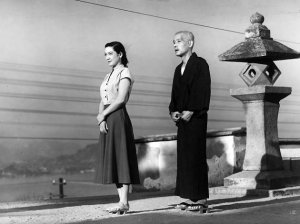Tokyo Story
As long as life goes on, relationships between parents and children will bring boundless joy and endless grief.

|
“Isn’t life disappointing”, wonders one character wistfully - not in the hands of Ozu it’s not.
The Japanese director (in the humble eyes of this reviewer, the greatest the country ever produced) became renowned for his chronicling of modern domestic life: as an example, one of his films is called The Flavour of Green Tea over Rice, named for the savouring of simple food which brings a couple out of their married malaise. But Tokyo Story is generally agreed to be the pinnacle, a simple story of families and their gentle, shifting dynamics which becomes so open and warm in its direct emotion. His trademark style of filming conversations from direct point-of-view eyelines has never been deployed to better, more heart-rending effect.
An old couple - not exactly lonely, but detached from their family - decide to travel from their remote home to visit their grown-up children in the titular city. But, the son and daughter have their own lives, their own families, and are too busy to treat the parents to a good holiday - or even show them much affection. It falls to Noriko, the wife of the couple’s late son and a recurring character in Ozu, to look after the elderly pair; just seeing Setsuko Hara, who plays Noriko, and Chishū Ryū as the father together is an inexorably moving experience (the latter appeared in all but two of the director’s films). With the various delicate contrasts between age and lifestyle that the film sets up, it works as a utterly understated comedy of modern gentrification, while the sadness of family differences too wide to cross builds to a head in the final sequences. Transcendent tear-jerkers never looked so beautiful.
Max King
Once a decade, Sight & Sound magazine publishes a list of the 100 greatest-ever films according to critics, academics, distributors, and filmmakers. By all accounts, these polls are the most prestigious rankings one can find. In 2012, 358 directors offered their opinions, and the overall winner may seem surprising. The number one movie of all time, as voted by the artists themselves, was not a sweeping epic. It was not an abstract, experimental piece. It was not even necessarily a significant landmark in film history. Not Citizen Kane, not 2001: A Space Odyssey, not The Godfather. Instead, it was Tokyo Story (1953), a small-scale, patient, minimalist drama about children not lending enough attention to their parents. Its story could be summarised in one line, and much of the film merely consists of people talking in front of a static, low-angled camera. Even in its climactic moments, there are no dramatic confrontations, nor grand revelations, and perhaps this is partly the reason for its lasting acclaim: Tokyo Story is incredibly simple, yet quietly powerful in a manner few other films have captured before or since.
Yesujiro Ozu, the director, did not see much success during his lifetime. Like his peer Akira Kurosawa, he represented an older generation that became outdated once a constant stream of Godzilla movies saturated the market. Distributors thought Tokyo Story to be “too Japanese”, and thus it saw limited release internationally. They were wrong. The westernisation of post-war Tokyo is certainly an underlying theme, and knowledge of Japanese tradition and culture may help, but its fundamental spirit is one of family. Japanese or not, any viewer can relate to the process of growing up, gradually losing time to spend with one’s parents, in the futile assumption that it will be paid off some day. This lack of time is painted as an inescapable reality; no one is a villain in Tokyo Story, only victims to the course of life. It is not sentimental, yet universal in its emotional resonance. It is one of the greatest films ever made.
Chris Mantafounis
More Information | Back to Previous Schedule | This Season | BBFC Classification Guidelines
Screenings of this film:
| 2021/2022 Spring Term – (35mm) |


